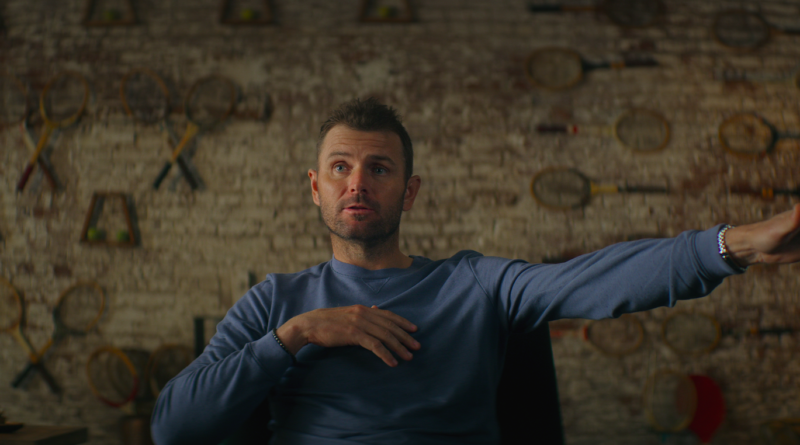INTERVIEW: Netflix tells ‘Untold’ story of tennis player Mardy Fish
Photo: Mardy Fish is the subject of Untold: Breaking Point on Netflix. Photo courtesy of Netflix / Provided by press site with permission.
Untold, the new Netflix documentary series, is the work of Chapman and Maclain Way, who focus on several engaging and gripping sports stories during the inaugural season of the show. One episode looks at the infamous brawl at an Indiana Pacers and Detroit Pistons game in 2004, while another episode focuses on Caitlyn Jenner and her Olympic career.
In the episode “Breaking Point,” the story of professional tennis player Mardy Fish takes center stage, or center court. Specifically, the documentary opens up about Fish’s severe anxiety disorder and how it has impacted his personal and professional life.
“I’ve always been very careful which outlet I’ve used to talk about it,” Fish said in a recent phone interview. “I was really lucky to have the Way brothers. They’re just phenomenal, first and foremost, phenomenal directors and producers and writers, and then they have a unique perspective on tennis because they actually grew up with a colleague of mine who is still on tour, a guy named Sam Querrey. So they were actually in the crowd on a couple matches that I played Sam professionally, so my point is they understand tennis really well. … It was a huge honor to have them do that and write it and obviously be a part of it.”
Fish grew up in a tennis family, and with his father serving as a tennis pro, he fell in love with the sport at a young age. The documentary talks about these early years and his training at the Saddlebrook Academy as a teenager. There’s also a segment about his enduring friendship with Andy Roddick. Then, he ascended to the top of the tennis world a dozen or so years ago when he emerged on the Association of Tennis Professionals (ATP) tour. He was even the top-seeded American player in 2011 for the World Tour Finals, according to press notes.
But then, in 2012, Fish bowed out of a match during the U.S. Open quarterfinals against Roger Federer. He was later diagnosed with severe anxiety disorder and eventually quit professional tennis, deciding to lead a private life and leave the public spotlight behind. As the documentary shows, there were times when he wouldn’t leave his house for months. Today, he is open about his mental health, has become an advocate and still tries to stay connected to his beloved sport.
“First of all, mental health doesn’t care what you do for a living, so it can take you down whether you’re a journalist or a professional tennis player,” he said. “It simply doesn’t care what your last name is, what you do for a living. Everyone’s bubble is their own bubble and world, and everyone has stresses and anxieties in their life. And you want that to a certain extent. You don’t want it too much or overboard, but you certainly want stress and anxiety in your life. Otherwise you won’t get out of bed in the morning.”
Fish said he believes tennis is a unique sport when considering the mental stress and anxiety a player can have. When he would leave the locker room and head for the court, he felt alone. He needed to figure out how to compete against one other person, who was all the way on the other side of the playing space.
“We get no help with that,” Fish said. “We walk out, and we don’t have a coach or a cornerman or a caddy or anything like that to talk to or to say, hey, what do you think here, or how should I play this guy or this lady. In that regard, it’s a very individual sport, and so we’re trained at a young age to not show … weakness or not show fear or being tired. You look on the other side of the court, and you see a guy with their hands on their knees, you’re like, OK, I got this guy. He’s tired. I’ve been trained for a long time not to do that, to not show that weakness or vulnerability, and coming out and talking about mental health is really the extreme opposite.”
Fish is not alone. According to the National Alliance on Mental Illness, 1 in 5 adults experience mental illness, and 1 in 20 adults experience serious mental illness. For Fish, talking about his journey with mental health, which is a daily battle, helps him, and he relies on a support system, which he believes has been an important part of his success.
“It’s so important to have a great support system around you when you’re dealing with some mental health issue because if you don’t, you really, really get in bad shape,” he said. “I was very lucky to have a great support system, but if I didn’t, there is no telling if I’d still be here or not. … That’s one of the reasons why I started talking about it because it made me feel better when I talked about it. Not everybody is that way, at least that’s my guess, but for me I loved talking about it because it took me out of [that feeling of] I’m alone and I’m by myself and I’m the only one dealing with this kind of thing. And you’re just simply not. There are tens of millions of people that deal with mental health just in the United States every day, so it’s something that is very prevalent in our society and something that we’re hoping to educate people more and more about.”
By John Soltes / Publisher / John@HollywoodSoapbox.com
Untold, from Chapman and Maclain Way, is now streaming on Netflix. Mardy Fish’s episode is titled “Breaking Point.” Click here for more information.

